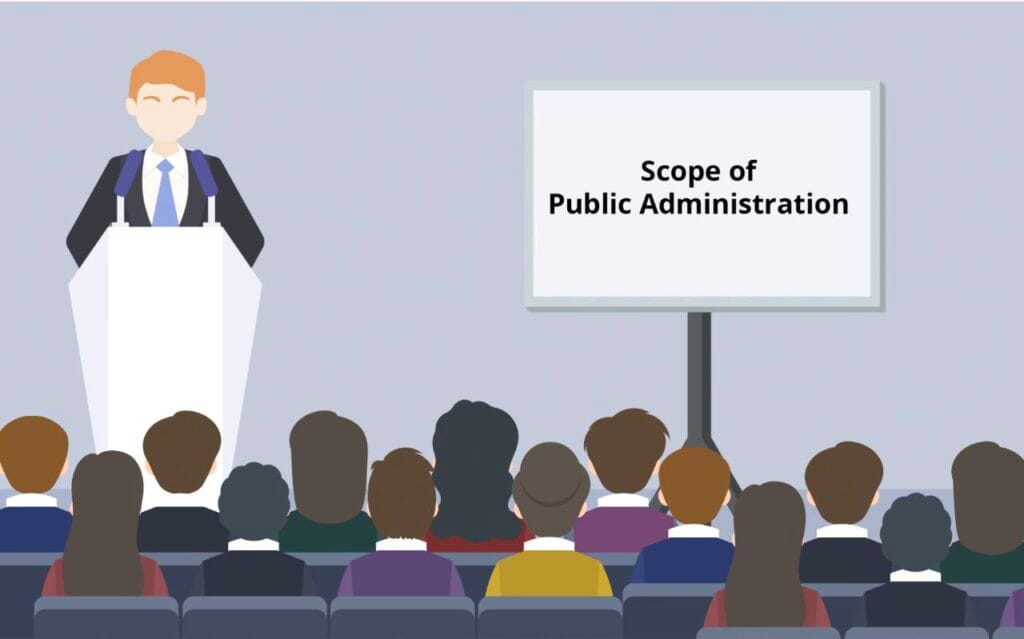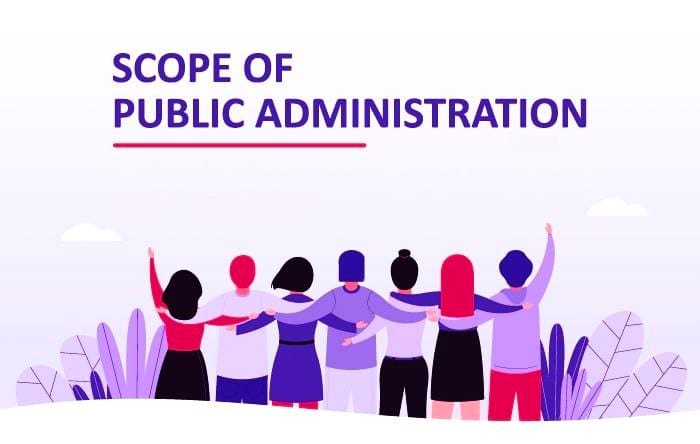
The scope of Public Administration refers to the areas, activities, and functions that fall under the domain of government administration and management. It encompasses a wide range of activities aimed at ensuring the effective implementation of public policies, the provision of public services, and the management of public resources.
1. Implementation of Public Policy

- Scope: Public administration plays a critical role in translating political decisions and policies into practical actions and programs. This involves implementing laws, regulations, and policies passed by the legislative and executive branches.
- Example: Administering welfare programs, environmental regulations, or public health initiatives.
2. Management of Public Programs
- Scope: Public administrators manage a variety of public programs that deliver services to citizens, such as healthcare, education, transportation, and social security. This involves coordinating efforts between various government departments and agencies.
- Example: Managing national healthcare programs like Medicare, or public education systems.
3. Regulatory Functions
- Scope: Public administration is responsible for enforcing laws and regulations that govern various sectors, including finance, labor, the environment, and public safety. Regulatory bodies are established to ensure compliance with the law and to protect public interests.
- Example: The role of the Environmental Protection Agency (EPA) in enforcing environmental laws or the Securities and Exchange Commission (SEC) regulating financial markets.
4. Public Service Delivery
- Scope: One of the core functions of public administration is to deliver essential public services efficiently and equitably. This includes a wide array of services such as water supply, waste management, healthcare, public education, and transportation.
- Example: The management of public hospitals, schools, and municipal services like garbage collection or public transportation.
5. Policy Formulation and Advisory Role
- Scope: Public administrators provide critical input into the policy-making process. They advise elected officials on policy options based on technical expertise, research, and practical experience, helping to shape public policy before it is implemented.
- Example: Government agencies like the Department of Transportation advising on infrastructure policies or public health departments shaping healthcare regulations.
6. Budgeting and Financial Management
- Scope: Managing public finances, including the formulation, approval, and execution of government budgets, is a key responsibility of public administration. This includes ensuring the efficient use of public funds, maintaining fiscal accountability, and conducting audits.
- Example: The preparation of national, state, or local government budgets, overseeing public expenditures, and ensuring that public funds are used effectively.
7. Human Resource Management
- Scope: Public administration includes managing public sector employees, recruiting, training, and developing the workforce. This also includes ensuring fair employment practices, managing labor relations, and ensuring the welfare of government employees.
- Example: The recruitment process for civil servants, the management of public sector pensions, and training programs for government employees.
8. Administrative Law and Procedures
- Scope: Public administration operates within a legal framework, and public administrators must ensure that their actions conform to the laws and regulations governing public activities. They are responsible for drafting rules, procedures, and regulations for implementing policies.
- Example: Developing and enforcing administrative regulations that govern how public agencies operate, including how public tenders or contracts are awarded.
9. Crisis and Disaster Management
- Scope: Public administration plays a critical role in managing crises, including natural disasters, pandemics, or economic crises. Administrators coordinate emergency responses, allocate resources, and ensure that essential services continue to function during crises.
- Example: FEMA (Federal Emergency Management Agency) in the U.S. coordinating disaster response efforts during hurricanes or earthquakes.
10. Public Accountability and Transparency
- Scope: Ensuring accountability and transparency in public administration is essential for maintaining public trust. Public administrators must ensure that government actions and decisions are open to public scrutiny and comply with legal and ethical standards.
- Example: The role of oversight bodies such as ombudsmen or public audit agencies in ensuring that government agencies are accountable for their decisions and actions.
11. Development Administration
- Scope: Public administration in developing countries often focuses on development administration, which involves managing programs aimed at socioeconomic development. This includes poverty alleviation, rural development, and infrastructure development.
- Example: Managing agricultural extension services, rural electrification projects, or community health programs in developing regions.
12. International and Comparative Public Administration
- Scope: Public administration has expanded to include comparative studies across countries and regions, as well as collaboration between governments on global issues such as climate change, terrorism, and economic development.
- Example: Public administrators working on international development projects funded by the World Bank, or coordinating cross-border environmental agreements.
13. E-Governance and Digital Administration
- Scope: In the modern era, the scope of public administration has expanded to include digital governance and the use of technology in delivering public services. E-governance initiatives improve service delivery, transparency, and citizen engagement.
- Example: The use of online platforms for tax filing, social services applications, and public consultation processes.
14. Social Welfare and Public Health
- Scope: Public administration also covers the management of social welfare and public health services, ensuring that vulnerable populations have access to necessary services. Administrators oversee programs related to healthcare, pensions, unemployment benefits, and housing.
- Example: Managing public health initiatives like vaccination campaigns or unemployment insurance programs.
15. Environmental Management
- Scope: With growing global concerns over environmental sustainability, public administration also includes managing natural resources, protecting biodiversity, and implementing environmental policies at national and international levels.
- Example: Public agencies responsible for enforcing environmental laws and promoting sustainable development practices, such as the EPA in the United States or similar bodies in other countries.
Conclusion :
The scope of Public Administration is vast and ever-expanding, encompassing the implementation of public policies, service delivery, resource management, and ensuring public accountability. Its reach extends across all aspects of governance, from managing everyday services to responding to complex challenges like climate change, global health crises, and socioeconomic development. Public administration is essential for ensuring the functioning of the government, maintaining order, and providing the necessary services and infrastructure for the public’s welfare.
